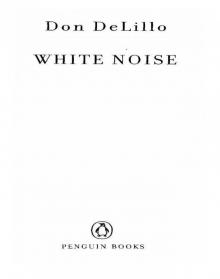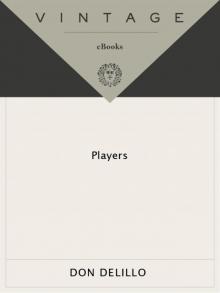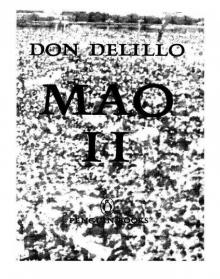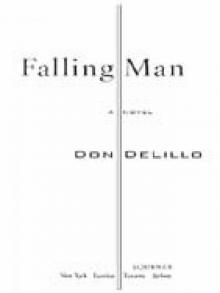- Home
- Don DeLillo
White Noise Page 5
White Noise Read online
Page 5
Denise watched her mother pull the little cellophane ribbon on a bonus pack of sixteen individually wrapped units of chewing gum. Her eyes narrowed as she turned back to the address books on the kitchen table before her. The eleven-year-old face was an expert mask of restrained exasperation.
She waited a long moment, then said evenly, “That stuff causes cancer in laboratory animals in case you didn’t know.”
“You wanted me to chew sugarless gum, Denise. It was your idea.”
“There was no warning on the pack then. They put a warning, which I would have a hard time believing you didn’t see.”
She was transcribing names and phone numbers from an old book to a new one. There were no addresses. Her friends had phone numbers only, a race of people with a seven-bit analog consciousness.
“I’m happy to do it either way,” Babette said. “It’s totally up to you. Either I chew gum with sugar and artificial coloring or I chew sugarless and colorless gum that’s harmful to rats.”
Steffie got off the phone. “Don’t chew at all,” she said. “Did you ever think of that?”
Babette was breaking eggs into a wooden salad bowl. She gave me a look that wondered how the girl could talk on the phone and listen to us at the same time. I wanted to say because she finds us interesting.
Babette said to the girls, “Look, either I chew gum or I smoke. If you want me to start smoking again, take away my chewing gum and my Mentho-Lyptus.”
“Why do you have to do one or the other?” Steffie said. “Why not do neither one?”
“Why not do both?” Denise said, the face carefully emptying itself of expression. “That’s what you want, isn’t it? We all get to do what we want, don’t we? Except if we want to go to school tomorrow we can’t because they’re fumigating the place or whatever.”
The phone rang; Steffie grabbed it.
“I’m not a criminal,” Babette said. “All I want to do is chew a pathetic little tasteless chunk of gum now and then.”
“Well it’s not that simple,” Denise said.
“It’s not a crime either. I chew about two of those little chunks a day.”
“Well you can’t anymore.”
“Well I can, Denise. I want to. Chewing happens to relax me. You’re making a fuss over nothing.”
Steffie managed to get our attention by the sheer pleading force of the look on her face. Her hand was over the mouthpiece of the phone. She did not speak but only formed the words.
The Stovers want to come over.
“Parents or children?” Babette said.
My daughter shrugged.
“We don’t want them,” Babette said.
“Keep them out,” Denise said.
What do I say?
“Say anything you want.”
“Just keep them out of here.”
“They’re boring.”
“Tell them to stay home.”
Steffie retreated with the phone, appearing to shield it with her body, her eyes full of fear and excitement.
“A little gum can’t possibly hurt,” Babette said.
“I guess you’re right. Never mind. Just a warning on the pack.”
Steffie hung up. “Just hazardous to your health,” she said.
“Just rats,” Denise said. “I guess you’re right. Never mind.”
“Maybe she thinks they died in their sleep.”
“Just useless rodents, so what’s the difference?”
“What’s the difference, what’s the fuss?” Steffie said.
“Plus I’d like to believe she chews only two pieces a day, the way she forgets things.”
“What do I forget?” Babette said.
“It’s all right,” Denise said. “Never mind.”
“What do I forget?”
“Go ahead and chew. Never mind the warning. I don’t care.”
I scooped Wilder off a chair and gave him a noisy kiss on the ear and he shrank away in delight. Then I put him on the counter and went upstairs to find Heinrich. He was in his room studying the deployment of plastic chessmen.
“Still playing with the fellow in prison? How’s it going?”
“Pretty good. I think I got him cornered.”
“What do you know about this fellow? I’ve been meaning to ask.”
“Like who did he kill? That’s the big thing today. Concern for the victim.”
“You’ve been playing chess with the man for months. What do you know about him except that he’s in jail for life, for murder? Is he young, old, black, white? Do you communicate at all except for chess moves?”
“We send notes sometimes.”
“Who did he kill?”
“He was under pressure.”
“And what happened?”
“It kept building and building.”
“So he went out and shot someone. Who did he shoot?”
“Some people in Iron City.”
“How many?”
“Five.”
“Five people.”
“Not counting the state trooper, which was later.”
“Six people. Did he care for his weapons obsessively? Did he have an arsenal stashed in his shabby little room off a six-story concrete car park?”
“Some handguns and a bolt-action rifle with a scope.”
“A telescopic sight. Did he fire from a highway overpass, a rented room? Did he walk into a bar, a washette, his former place of employment and start firing indiscriminately? People scattering, taking cover under tables. People out on the street thinking they heard firecrackers. ‘I was just waiting for the bus when I heard this little popping noise like firecrackers going off.’ ”
“He went up to a roof.”
“A rooftop sniper. Did he write in his diary before he went up to the roof? Did he make tapes of his voice, go to the movies, read books about other mass murderers to refresh his memory?”
“Made tapes.”
“Made tapes. What did he do with them?”
“Sent them to people he loved, asking for forgiveness.”
“ ‘I can’t help myself, folks.’ Were the victims total strangers? Was it a grudge killing? Did he get fired from his job? Had he been hearing voices?”
“Total strangers.”
“Had he been hearing voices?”
“On TV.”
“Talking just to him? Singling him out?”
“Telling him to go down in history. He was twenty-seven, out of work, divorced, with his car up on blocks. Time was running out on him.”
“Insistent pressuring voices. How did he deal with the media? Give lots of interviews, write letters to the editor of the local paper, try to make a book deal?”
“There is no media in Iron City. He didn’t think of that till it was too late. He says if he had to do it all over again, he wouldn’t do it as an ordinary murder, he would do it as an assassination.”
“He would select more carefully, kill one famous person, get noticed, make it stick.”
“He now knows he won’t go down in history.”
“Neither will I.”
“But you’ve got Hitler.”
“Yes, I have, haven’t 1?”
“What’s Tommy Roy Foster got?”
“All right, he’s told you all these things in the letters he sends. What do you say when you respond?”
“I’m losing my hair.”
I looked at him. He wore a warmup suit, a towel around his neck, sweatbands on both wrists.
“You know what your mother would say about this chess by mail relationship.”
“I know what you would say. You’re saying it.”
“How is your mother? Hear from her lately?”
“She wants me to go out to the ashram this summer.”
“Do you want to go?”
“Who knows what I want to do? Who knows what anyone wants to do? How can you be sure about something like that? Isn’t it all a question of brain chemistry, signals going back and forth, electrical energy in the cortex? How do you know
whether something is really what you want to do or just some kind of nerve impulse in the brain? Some minor little activity takes place somewhere in this unimportant place in one of the brain hemispheres and suddenly I want to go to Montana or I don’t want to go to Montana. How do I know I really want to go and it isn’t just some neurons firing or something? Maybe it’s just an accidental flash in the medulla and suddenly there I am in Montana and I find out I really didn’t want to go there in the first place. I can’t control what happens in my brain, so how can I be sure what I want to do ten seconds from now, much less Montana next summer? It’s all this activity in the brain and you don’t know what’s you as a person and what’s some neuron that just happens to fire or just happens to misfire. Isn’t that why Tommy Roy killed those people?”
In the morning I walked to the bank. I went to the automated teller machine to check my balance. I inserted my card, entered my secret code, tapped out my request. The figure on the screen roughly corresponded to my independent estimate, feebly arrived at after long searches through documents, tormented arithmetic. Waves of relief and gratitude flowed over me. The system had blessed my life. I felt its support and approval. The system hardware, the mainframe sitting in a locked room in some distant city. What a pleasing interaction. I sensed that something of deep personal value, but not money, not that at all, had been authenticated and confirmed. A deranged person was escorted from the bank by two armed guards. The system was invisible, which made it all the more impressive, all the more disquieting to deal with. But we were in accord, at least for now. The networks, the circuits, the streams, the harmonies.
11
I WOKE IN THE GRIP of a death sweat. Defenseless against my own racking fears. A pause at the center of my being. I lacked the will and physical strength to get out of bed and move through the dark house, clutching walls and stair rails. To feel my way, reinhabit my body, re-enter the world. Sweat trickled down my ribs. The digital reading on the clock-radio was 3:51. Always odd numbers at times like this. What does it mean? Is death odd-numbered? Are there life-enhancing numbers, other numbers charged with menace? Babette murmured in her sleep and I moved close, breathing her heat.
Finally I slept, to be awakened by the smell of burning toast. That would be Steffie. She burns toast often, at any hour, intentionally. She loves the smell, she is addicted; it’s her treasured scent. It satisfies her in ways wood smoke cannot, or snuffed candles, or the odor of explosive powder drifting down the street from firecrackers set off on the Fourth. She has evolved orders of preference. Burnt rye, burnt white, so on.
I put on my robe and went downstairs. I was always putting on a bathrobe and going somewhere to talk seriously to a child. Babette was with her in the kitchen. It startled me. I thought she was still in bed.
“Want some toast?” Steffie said.
“I’ll be fifty-one next week.”
“That’s not old, is it?”
“I’ve felt the same for twenty-five years.”
“Bad. How old is my mother?”
“She’s still young. She was only twenty when we were married the first time.”
“Is she younger than Baba?”
“About the same. Just so you don’t think I’m one of those men who keeps finding younger women.”
I wasn’t sure whether my replies were meant for Steffie or Babette. This happens in the kitchen, where the levels of data are numerous and deep, as Murray might say
“Is she still in the CIA?” Steffie said.
“We’re not supposed to talk about that. She’s just a contract agent anyway.”
“What’s that?”
“That’s what people do today for a second income.”
“What exactly does she do?” Babette said.
“She gets a phone call from Brazil. That activates her.”
“Then what?”
“She carries money in a suitcase the length and breadth of Latin America.”
“That’s all? I could do that.”
“Sometimes they send her books to review.”
“Have I met her?” Babette said.
“No.”
“Do I know her name?”
“Dana Breedlove.”
Steffie’s lips formed the words as I spoke them.
“You’re not planning to eat that, are you?” I said to her.
“I always eat my toast.”
The phone rang and I picked it up. A woman’s voice delivered a high-performance hello. It said it was computer-generated, part of a marketing survey aimed at determining current levels of consumer desire. It said it would ask a series of questions, pausing after each to give me a chance to reply.
I gave the phone to Steffie. When it became clear that she was occupied with the synthesized voice, I spoke to Babette in low tones.
“She liked to plot.”
“Who?”
“Dana. She liked to get me involved in things.”
“What kind of things?”
“Factions. Playing certain friends against other friends. Household plots, faculty plots.”
“Sounds like ordinary stuff.”
“She spoke English to me, Spanish or Portuguese to the telephone.”
Steffie twisted around, used her free hand to pull her sweater away from her body, enabling her to read the label.
“Virgin acrylic,” she said into the phone.
Babette checked the label on her sweater. A soft rain began to fall.
“How does it feel being nearly fifty-one?” she said.
“No different from fifty.”
“Except one is even, one is odd,” she pointed out.
That night, in Murray’s off-white room, after a spectacular meal of Cornish hen in the shape of a frog, prepared on a two-burner hot plate, we moved from our metal folding chairs to the bunk bed for coffee.
“When I was a sportswriter,” Murray said, “I traveled constantly, lived in planes and hotels and stadium smoke, never got to feel at home in my own apartment. Now I have a place.”
“You’ve done wonders,” Babette said, her gaze sweeping desperately across the room.
“It’s small, it’s dark, it’s plain,” he said in a self-satisfied way. “A container for thought.”
I gestured toward the old four-story building on several acres across the street. “Do you get any noise from the insane asylum?”
“You mean beatings and shrieks? It’s interesting that people still call it the insane asylum. It must be the striking architecture, the high steep roof, the tall chimneys, the columns, the little flourishes here and there that are either quaint or sinister—I can’t make up my mind. It doesn’t look like a rest home or psychiatric facility. It looks like an insane asylum.”
His trousers were going shiny at the knees.
“I’m sorry you didn’t bring the kids. I want to get to know small kids. This is the society of kids. I tell my students they’re already too old to figure importantly in the making of society. Minute by minute they’re beginning to diverge from each other. ‘Even as we sit here,’ I tell them, ‘you are spinning out from the core, becoming less recognizable as a group, less targetable by advertisers and mass-producers of culture. Kids are a true universal. But you’re well beyond that, already beginning to drift, to feel estranged from the products you consume. Who are they designed for? What is your place in the marketing scheme? Once you’re out of school, it is only a matter of time before you experience the vast loneliness and dissatisfaction of consumers who have lost their group identity.’ Then I tap my pencil on the table to indicate time passing ominously.”
Because we were seated on the bed, Murray had to lean well forward, looking past the coffee cup poised in my hand, in order to address Babette.
“How many children do you have, all told?”
She appeared to pause.
“There’s Wilder, of course. There’s Denise.”
Murray sipped his coffee, trying to look at her, sideways, with the cup at his lower lip.
/>
“There’s Eugene, who’s living with his daddy this year in Western Australia. Eugene is eight. His daddy does research in the outback. His daddy is also Wilder’s daddy.”
“The boy is growing up without television,” I said, “which may make him worth talking to, Murray, as a sort of wild child, a savage plucked from the bush, intelligent and literate but deprived of the deeper codes and messages that mark his species as unique.”
“TV is a problem only if you’ve forgotten how to look and listen,” Murray said. “My students and I discuss this all the time. They’re beginning to feel they ought to turn against the medium, exactly as an earlier generation turned against their parents and their country. I tell them they have to learn to look as children again. Root out content. Find the codes and messages, to use your phrase, Jack.”
“What do they say to that?”
“Television is just another name for junk mail. But I tell them I can’t accept that. I tell them I’ve been sitting in this room for more than two months, watching TV into the early hours, listening carefully, taking notes. A great and humbling experience, let me tell you. Close to mystical.”
“What’s your conclusion?”
He crossed his legs primly and sat with the cup in his lap, smiling straight ahead.
“Waves and radiation,” he said. “I’ve come to understand that the medium is a primal force in the American home. Sealed-off, timeless, self-contained, self-referring. It’s like a myth being born right there in our living room, like something we know in a dreamlike and preconscious way. I’m very enthused, Jack.”
He looked at me, still smiling in a half sneaky way.
“You have to learn how to look. You have to open yourself to the data. TV offers incredible amounts of psychic data. It opens ancient memories of world birth, it welcomes us into the grid, the network of little buzzing dots that make up the picture pattern. There is light, there is sound. I ask my students, ‘What more do you want?’ Look at the wealth of data concealed in the grid, in the bright packaging, the jingles, the slice-of-life commercials, the products hurtling out of darkness, the coded messages and endless repetitions, like chants, like mantras. ‘Coke is it, Coke is it, Coke is it.’ The medium practically overflows with sacred formulas if we can remember how to respond innocently and get past our irritation, weariness and disgust.”

 Great Jones Street (Contemporary American Fiction)
Great Jones Street (Contemporary American Fiction) Americana
Americana Running Dog
Running Dog Libra
Libra End Zone
End Zone Ratner's Star
Ratner's Star Underworld
Underworld White Noise
White Noise Players
Players Cosmopolis
Cosmopolis The Silence
The Silence Mao II
Mao II Zero K
Zero K Great Jones Street
Great Jones Street The Angel Esmeralda
The Angel Esmeralda The Names
The Names The Body Artist
The Body Artist Point Omega
Point Omega Falling Man
Falling Man